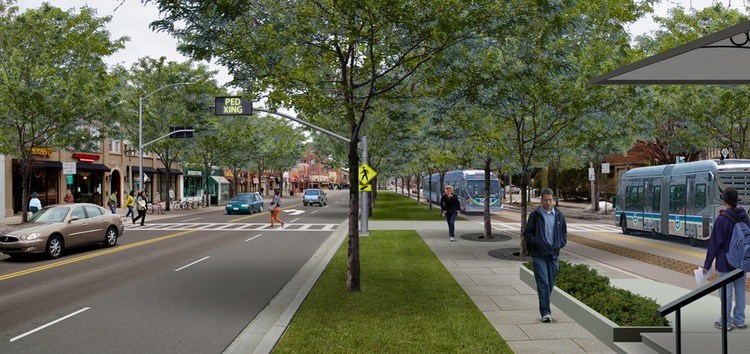A plan to upgrade Lansing's busiest bus route was shelved earlier this week. The transit authority said the uncertainty of federal funding under the Trump administration, along with the costs of continuing to study the project, were enough to kill it. Eight years in the making, the project was also undone by suburban opposition. Now, transit advocates in Michigan's capital are figuring out what can be done to improve transit while their opponents take a victory lap.
The $143 million project would have added center-running bus lanes and stations along 8.3 miles of Michigan and Grand River avenues, wide streets connecting downtown Lansing, East Lansing, Michigan State University, and Meridian Township. A study of bus, streetcar, and light rail options began in 2009, and in 2011 the Capital Area Transportation Authority board decided to proceed with BRT.
Over the past year, opposition forces began to organize on Facebook, centered on suburban Meridian Township. Last July, the township board came out against plans to add bus lanes and restrict left turns. A month later, the Lansing Regional Chamber of Commerce joined in. Even Michigan State University, which has thousands of students that would benefit from BRT, made noises against the project.
"We’re the automobile state and we have this assumption that everybody should have a car, which is false," said Laurel Burchfield, a Lansing resident who co-founded Capital Area Transit Supporters last year to push back against BRT naysayers. “There was a very organized opposition that played a really large role in this. And that’s something we need to think about locally moving forward. How do you respond to this NIMBYism?"
BRT did have its backers, including Lansing Mayor Virgil Bernero. But his combative reputation didn't exactly help the project. “He came out vocally in support, but that didn’t necessarily help our cause,” Burchfield said. “He’s the angriest mayor in America.”
“It seems like no one was really battling to support it at all," said Sean Hammond, deputy policy director at the Michigan Environmental Council and co-founder of Capital Area Transit Supporters. “It wasn’t really a coordinated effort to get supporters out and spread the word about why exactly this is a good thing for the region.”
On Wednesday, CATA's longtime executive director announced her retirement. The same day, the transit authority's board voted to suspend the BRT plan, citing the cost of continuing with an environmental study and the Trump administration's proposal to gut transit funding. The project was not funded locally, and depended on winning a federal New Starts grant, combined with state funds.
But Trump may not actually enact his slash-and-burn funding blueprint. While his transit cuts would be devastating to projects like Lansing's BRT, the proposal isn't guaranteed to survive the congressional budget process. Ultimately, it seems, local opposition is the lead culprit behind the death of Lansing BRT.
So where does that leave transit supporters?
"We’re going to have to increase bus service," Hammond said. "It could be something like BRT-lite, like Grand Rapids has, which doesn’t require as much capital."
“I would hate for transit as a general service to get hit because of opposition to one project," Burchfield said. "I view this as a postponement, not as a death note."






